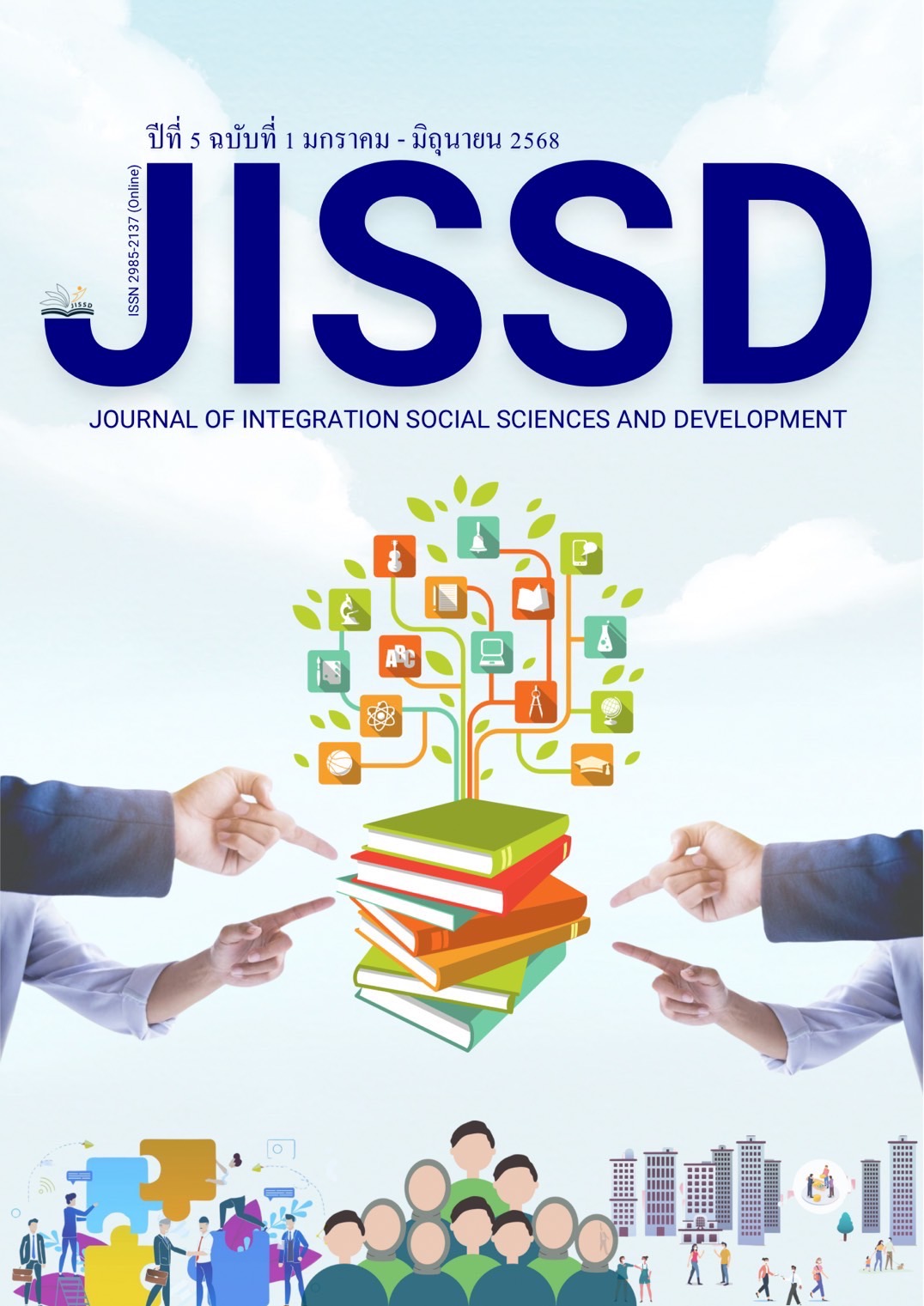Literature-Based Learning Experiences to Foster Social Skills in Early Childhood Students at Wat Ratniyomtham School (Phibunsongkhram)
Main Article Content
Abstract
This research aimed to 1. examine the relationship of social behaviors in early childhood before and after participating in literature-based learning activities, and 2. compare the social behaviors of early childhood children before and after the implementation of such activities. The population consisted of 30 boys and girls aged between 4 and 5 years, enrolled in Kindergarten Year 2 during the first semester of the 2024 academic year at Wat Ratniyomtham (Phibulsongkram) School, under the jurisdiction of the Nonthaburi Primary Educational Service Area Office 1. This study employed a quasi-experimental one-group pretest-posttest design. The research instruments included eight literature-based experiential learning activity plans and a social behavior observation form, covering three aspects: interpersonal interaction, social manners, and generosity. The intervention was carried out over eight weeks, three days per week—Tuesday, Wednesday, and Thursday—for 45 minutes per day during the experiential activity session. Data were analyzed using mean (μ), standard deviation (σ), and hypothesis testing was conducted using the Chi-square test and a test for differences between pretest and posttest scores.
The research findings: 1. The social behaviors of early childhood children before and after participating in literature-based learning activities were significantly correlated, both overall and in each specific aspect, at the .05 level of statistical significance. 2. The social behaviors of early childhood children after participating in literature-based learning activities to enhance their social skills were higher than before the experiment, both in overall behavior and in each specific aspect.
Article Details
References
กระทรวงศึกษาธิการ. (2560). หลักสูตรการศึกษาปฐมวัย พุทธศักราช 2560. สำนักงานคณะกรรมการการศึกษาขั้นพื้นฐาน.
กุลวรา ชูพงศ์ไพโรจน์. (2557). พฤติกรรมเด็ก: การเข้าใจและจัดการอย่างสร้างสรรค์. กรุงเทพฯ: สำนักพิมพ์แห่งจุฬาลงกรณ์มหาวิทยาลัย.
เกรียงศักดิ์ เจริญวงศ์ศักดิ์. (2551). การสร้างเสริมพฤติกรรมทางสังคมในเด็ก. กรุงเทพฯ: ซัคเซสมีเดีย.
ดารารัตน์ ทัพโต. (2554). การพัฒนาทักษะทางสังคมของเด็กปฐมวัยผ่านกิจกรรมการเรียนรู้. วิทยานิพนธ์ปริญญามหาบัณฑิต, มหาวิทยาลัยศรีนครินทรวิโรฒ.
ธันยา พิทธยาพิทักษ์. (2553). การศึกษาเปรียบเทียบพฤติกรรมทางสังคมของเด็กก่อนวัยเรียน. วิทยานิพนธ์ปริญญามหาบัณฑิต, มหาวิทยาลัยเกษตรศาสตร์.
ณัฏฐนิช สะมะจิตร์. (2551). การส่งเสริมพฤติกรรมทางสังคมของเด็กโดยใช้วรรณกรรม. วิทยานิพนธ์ปริญญามหาบัณฑิต, มหาวิทยาลัยมหาสารคาม.
ณัฐทิญาภรณ์ การะเกตุ. (2563). วรรณกรรมกับพัฒนาการทางสังคมของเด็กปฐมวัย. วิทยานิพนธ์ปริญญามหาบัณฑิต, มหาวิทยาลัยราชภัฏเชียงใหม่.
พรรณี บุญธรรม. (2557). แนวทางการพัฒนาพฤติกรรมทางสังคมของเด็กปฐมวัย. กรุงเทพฯ: สำนักพิมพ์วัฒนาพานิช.
พิศมัย สุขขี. (2560). ผลของกิจกรรมวรรณกรรมเพื่อพัฒนาพฤติกรรมทางสังคมของเด็กปฐมวัย. วิทยานิพนธ์ปริญญามหาบัณฑิต, มหาวิทยาลัยราชภัฏสวนสุนันทา.
ศุภรักษ์ ฮามคำไพ. (2563). การจัดกิจกรรมวรรณกรรมเพื่อส่งเสริมพฤติกรรมทางสังคมของเด็ก. วิทยานิพนธ์ปริญญามหาบัณฑิต, มหาวิทยาลัยราชภัฏอุดรธานี.
สิริมา ภิญโญอนันต์พงษ์. (2550). พัฒนาการทางสังคมของเด็กในช่วงวัยก่อนเรียน. กรุงเทพฯ: สำนักพิมพ์ไทยวัฒนาพานิช.
สำนักงานเลขาธิการสภาผู้แทนราษฎร. (2550). รายงานการวิจัยเกี่ยวกับพฤติกรรมของเด็กและเยาวชนในสังคมไทย. กรุงเทพฯ: สำนักงานเลขาธิการสภาผู้แทนราษฎร.
สุภาภรณ์ จิราภา. (2562). พฤติกรรมทางสังคมของเด็กปฐมวัยที่เรียนผ่านวรรณกรรม. วิทยานิพนธ์ปริญญามหาบัณฑิต,มหาวิทยาลัยราชภัฏพระนคร.
สุภาวดี โพธิยะราช. (2560). แนวทางการใช้วรรณกรรมสำหรับเด็กเพื่อส่งเสริมพฤติกรรมเชิงบวก. วิทยานิพนธ์ปริญญามหาบัณฑิต, มหาวิทยาลัยราชภัฏสกลนคร.
Bloom, B. S. (1964). Taxonomy of educational objectives: The classification of educational goals. New York: Longman.
Eisenberg, M. E., Olson, R. E., Neumark-Sztainer, D., Story, M., & Bearinger, L. H. (2004). Correlations between family meals and psychosocial well-being among adolescents. Archives of Pediatrics & Adolescent Medicine, 158(8), 792–796.
Erikson, E. H. (1975). Childhood and society (2nd ed.). New York: Norton.
Sawyer, R. K. (2000). Children’s spontaneous improvisation: Musical and verbal performance. Creativity Research Journal, 13(3–4), 361–370.
Tomlinson, C. A., & Lynch-Brown, C. (1996). Essentials of children’s literature (3rd ed.). Boston: Allyn & Bacon.
Treffinger, D. J. (2007–2008). Preparing creative and critical thinkers. Educational Leadership, 65(2), 8–15.


